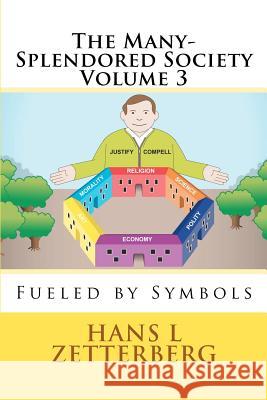The Many-Splendored Society Volume 3: Fueled by Symbols » książka
The Many-Splendored Society Volume 3: Fueled by Symbols
ISBN-13: 9781453624814 / Angielski / Miękka / 2010 / 220 str.
This third book on The Many-Splendored Society examines how we use language to inspire human beings to live in and develop their societies. We prompt ourselves by using "justifying vocabularies" and we prompt others by the use of "compelling vocabularies." These motivating vocabularies are short pieces of language with remarkable leverage. They epitomize the power of the language brain. Six justifying vocabularies are unique to each of the societal realms of science, art, economy, religion, polity, and morality. Four justifying vocabularies are at the core of the dominating ideologies in free societies: individualism, meritocracy, universalism, and egalitarianism. We review the far-reaching implications of some compelling vocabularies such as the selfish fact that people trust those who are like themselves more than they trust people unlike themselves. We deal with vocabularies avoiding social exclusion and preserving favorable self-images. As humans, we also have unselfish vocabularies trustful of others, for example, abetting the survival of our beneficial encounters and upholding the order that upholds us. In the final part in this volume, we find a synthesis of - or, better expressed, a "zipper" between - justifying and compelling vocabularies. We conclude that ordinary words in the zipped vocabularies actually can arrest a society's disintegration into the chaos of everybody's war against everyone else. This dual motivation can be strong enough to compete with bodily spontaneities and, in a majority of circumstances, be strong enough to serve as a substitute for violence as a means of social control. Their use makes for a civilized life, where conflicts are resolved, not by force, but by words, and where violence is reduced to the minimum needed to defend civility.











